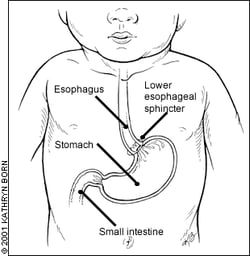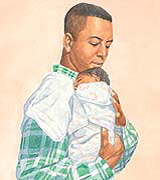Estroesophageal Reflux in Babies
What is gastroesophageal reflux?
Reflux is a term used when a baby spits up part or all of a feeding. This often happens during or after your baby eats. It is common and normal in babies.
Reflux tends to peak at 4 to 6 months of age when babies are more active. Most often it stops around 12 months of age.
What causes it?
- The tube that connects the mouth to the stomach is called the esophagus. There is a small muscle at the end of the tube called the sphincter.

- When your baby swallows, the sphincter relaxes to let food or fluids go into the stomach. The muscle then tightens to keep the food and fluid in the stomach.
- With reflux, the sphincter relaxes when the stomach is full. The food and fluid flow back into the esophagus. This causes the baby to spit up.
How does it affect my baby?
Babies with reflux may:
- Be hard to comfort.
- Wiggle, arch their back, cry, make faces, startle awake with movements.
- Cough or wheeze.
- Have a hard time breathing during or right after feedings. When your baby refluxes, stomach juices may go into the lungs and cause problems with breathing. Call the doctor right away if this happens.
Reflux is normal for babies who:
- Are gaining weight.
- Do not have a hard time breathing.
- Do not have bloody spit up.
What can I do?
Feeding
- If your baby spits up, don’t feed again right away. Wait until the next feeding time.
- Check with the doctor to be sure you are feeding the right amounts at the right times.
- Burp your baby often during feeding. Giving smaller amounts may be helpful.
- Do not bounce or jiggle your baby during or right after feedings.

- Check with the doctor or nurse to see if you can thicken your baby’s formula. If your doctor tells you to thicken the formula, use the amount that they say. You may need to cut the tip of the nipple with sterile razor blade:
- Pinch the top of the nipple.
- Make a very small cut at the top of the nipple. This will make the opening a bit bigger so the thickened formula flows through. Make the hole a bit bigger if needed.
- Try hypoallergenic formula for 2 weeks.
Position
- Keep your baby upright for at least 30 minutes after feeding.
- A sitting position may cause your baby to slouch which puts pressure on the stomach. It may make the reflux worse.
- When your baby is awake and you are with them put them on their tummy or on their left side. Sleeping babies are always put on their back.
- Try things that are calming. Use a pacifier, play gentle music, swaddle your baby, dim the lights and read to your baby.
Avoid
- Tight diapers and waistbands.
- Smoking makes reflux worse. There should be no smoking in the house or car.
Talk with your health care provider about how much and how often your baby spits up. Also talk about what your baby is doing during and after feedings. Is your baby crying, making faces, moving around a lot?
To help judge how much your baby is spitting up, pour a half ounce of water on a blanket or burp cloth. Compare it to your baby’s spit up on the burp cloth or their clothes. You may want to write down the amounts and when it happens.
If your baby has problems due to reflux, the doctor may make changes in feedings and/or start medicine. Surgery is rarely needed.



